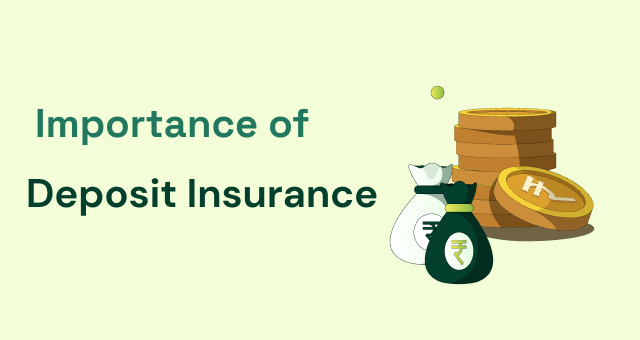
Why do we put our wealth in banks, as opposed to loading cash in our safe? The answer is common knowledge. Apart from being convenient, banks keep our money safe. But what if the bank fails? To understand this, let’s first see the basic rundown of how a bank works.
Banks accept deposits by individuals and pay them a percentage of interest on it. Now, the depositors’ money doesn’t just sit in the bank, it is used to lend loans to people who need them. These people then return it with interest after the loan period is over. The difference between the deposit interest banks pay and the loan interest they receive is the profit they make.
Occasionally though, it is possible that banks are not able to protect their own deposits. This can happen because of various reasons. Too many bad loans, too little liquidity to pay interest to depositors, or simply insolvency. This is where deposit insurance comes in.
In India, Deposit Insurance and Credit Guarantee Corporation (DICGC) does the job of protecting depositors’ money in case the bank is not able to pay them back. This agency is a wholly owned subsidiary of the RBI established in 1978. It insures a user’s deposit of up to ₹5 Lakhs. The insured amount is inclusive of both the principal and interest amount.
Why is this relevant for investors?
Over the years, quite a few banks have failed all over the world, leading to a lot of depositors losing their money. Out of these, there is a list of failed banks that belongs to India as well. The biggest misconception that plagues many people is that some banks are “too big to fall”. That’s often not the case. The recent silicon valley bank fall has proven this wrong, among many other banks closer home.
Seeing the deposits’ plight in the recent environment of banks failing in India, the insurance limit under DICGC was raised from ₹1 Lakh to ₹5 Lakhs in 2020. This means the users can rest assured of about ₹5 Lakhs of their deposit.
While this may not seem like a very large amount, diversifying deposits over a few banks could provide ample cover for their parked money. However, one thing to note is that all funds deposited in the same bank, across types of accounts, are added together when being considered for insurance. So, the deposits have to be made in different banks to ensure you get the ₹5 Lakh cover for each one.
What are the institutions covered under DICGC?
The institutions covered under DICGC include all Commercial and Cooperative banks. Commercial banks include all foreign banks functioning anywhere in India, local area banks, and regional rural banks. While cooperative banks include all State, Central, and Primary cooperative banks.
Cooperative banks, on the other hand, are banks that operate under the supervision of the Reserve Bank of India (RBI) in states and union territories that have amended their cooperative society laws. This amendment says that if a cooperative bank fails, the RBI has the power to close it down or take over its management. All cooperative banks are protected by the Deposit Insurance Scheme administered by the Deposit Insurance and Credit Guarantee Corporation (DICGC).
The DICGC insures all deposits such as savings, fixed, current, recurring, etc. However, there are some exclusions to what institutions are covered under the DICGC. These include:
- Deposits from foreign governments
- Primary cooperative societies
- State Co-operative Banks receiving deposits from State Land Development Banks.
- Amounts owed to India and deposits received from foreign sources.
- Central or state government deposits
- Inter-bank deposits
- Funds that have received prior approval from RBI and are exempted by the corporation.
While making deposits or opening an FD in Non-Banking Financial institutions (NBFCs), be vary of the fact that these are not covered by the DICGC. Examples of NBFCs providing these services include Bajaj Finance Limited, Muthoot Finance, HDB Finance Services, and Aditya Birla Finance Ltd, among others.
What’s the key takeaway for you?
The strength of the country’s economy is determined by the strength of its banking sector. It’s the glue that holds a country together and an inevitable part of all our lives. But with thousands of banks across the world and many right here in India, there are high chances that few will fail. So, to decrease your odds of losing your money, in case you happen to fall into these failed banks, you need to know your rights as a depositor.
Acquiring more knowledge helps you understand how you can best protect your money, no matter how the external environment changes. So, do your own research and maximize the safety of your money.

